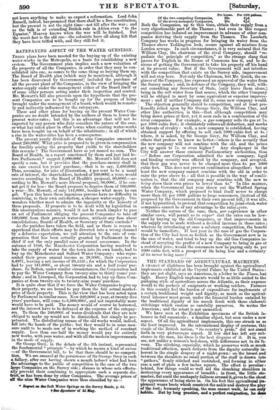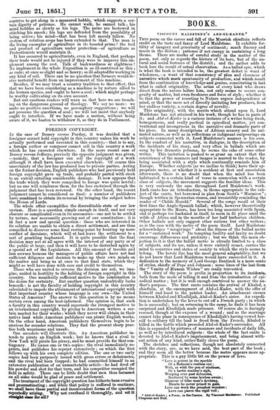THE STANDARD OF AGRICULTURAL MACHINES.
A CHARGE of slightness has been brought against the agricultural implements exhibited at the Crystal Palace by the United States : they are not slight, says an American, in a letter to the Times, but light. Heavy English implements would be as little suited to the galloping style of agriculture across the Atlantic, as their expense would to the pockets of emigrants or working settlers. Farmers in this country feel the burden of expenditure for implements of a certain traditional weight and dignity, as much as the agricul- tural labourer must groan under the financial burden entailed by the traditional dignity of his smock frock with those elaborate stitehings which custom so carefully preserves. Sc writes the American; and the retort is not unmerited.
We have seen at the Exhibition specimens of the British la- bourer in full canonicals ; a familiar object, but seen under a new aspect. Of all the agricultural implements, this one struck us as the least improved. In the international display of costume, this staple of the British nation, "its country's pride," did not stand forth in very picturesque aspect. If low .diet has left any sub- stance in the man, his dress is the best disguise of it. It is, you see, not unlike a woinan's bed-dress, with differences not in its fa- vour. The stitching, especially, which he preserves with so muck traditional affection, much detracts from the dignity naturally in- herent in the simple drapery of a night-gown : on the breast and between the shoulders no small portion of the stuff is drawn into " gathers " firmly stitched and restitched, and forming in either case a sort of plate a few inches square. The effect is peculiar : behind, few things could so well aid the slouching shoulders in destroying every appearance of breadth ; in front, the little sto- macher, at amid the =shapely fullness around it, gives to the ailed the appearance of being stove in. On his feet this agricultunal im- plement wears loots which constrict the ankle and destroy the play of the foot; humanly speaking, the man cannot walk, he can only hotdde. Bat by long practice, and a perfect resignation, he Apes
contrive to get along in a measured hobble, which suggests a cer- tain dignity of patience. He cannot walk, he cannot talk ; his mind hobbles as slowly as his legs. The pains are bestowed in stitching his smock ; his legs are defended from the possibility of being active ; his mind—that has been left merely fallow. No system of rotation crops has been extended to that. The man is the living exemplar of agriculture in its boasted prime ! the tool and product of agriculture under protection—of agriculture as Protectionists would maintain it.
It has occurred to agriculturists, even in England, that perhaps their trade would not be injured if they were to improve this im- plement among the rest. Talk of backwardness or slightness ! No implement in the whole Exposition is so ill-contrived as this ; so rude; at once so slight and so heavy; so ill-adaptedfor working in any kind of soil. There can be no question that farmers would de- rive material benefit from an improvement of this machine.
Besides, if we may trust a country tradition to that effect, this that we have been considering as a machine is by nature allied to the human species, and ought to have a soul ; -which might perhaps be worthy cultivating on its own account. But our cautious readers will warn us that here we are trench- ing on the dangerous ground of theology. We say no more : we make no positive assertions, no peremptory suggestions ; we will not presume the question of soul ; we will not insist that anybody ought to interfere. If we have made a motion, without being aware of it, we hasten to withdraw it, as they do in Parliament.



























 Previous page
Previous page